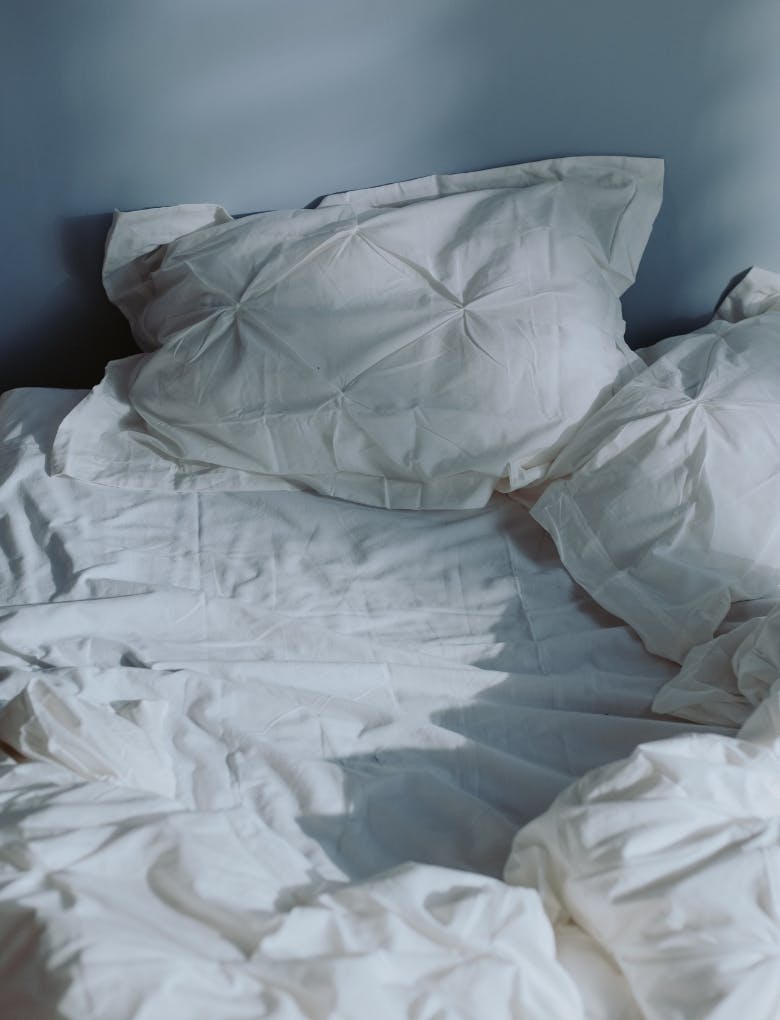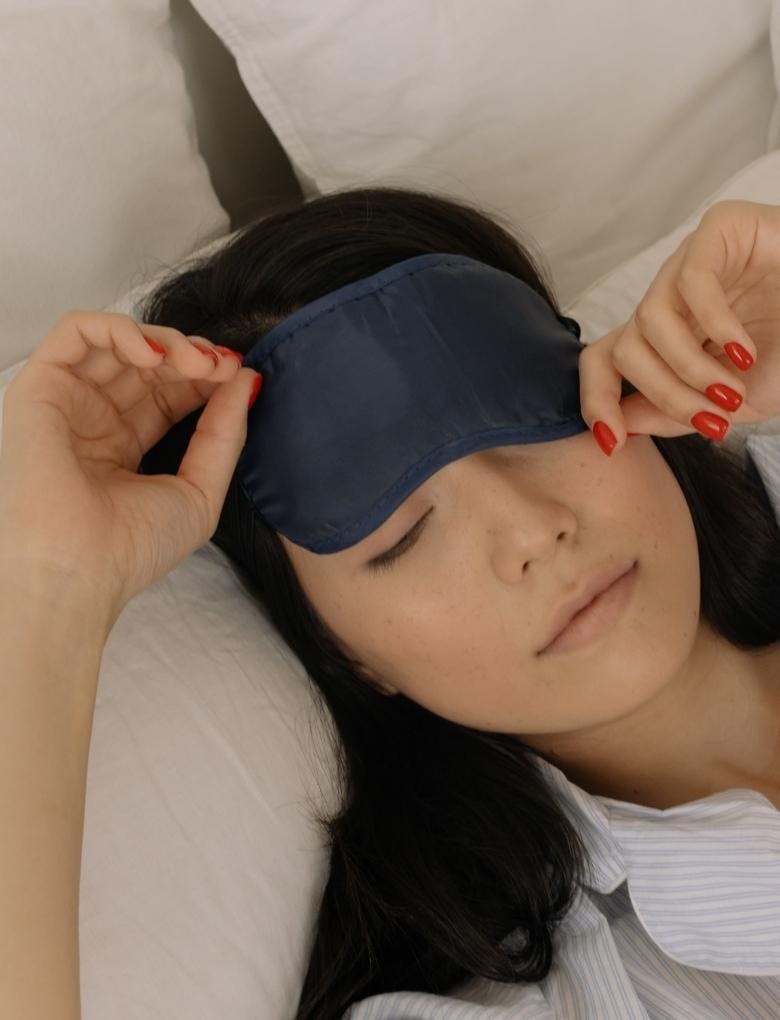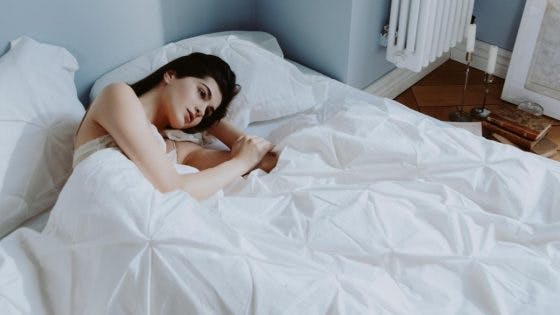How to Sleep Better: The Bedtime Routine To Try Now
6 minutes read
If we all learned how to sleep better, many aspects of our lives would naturally improve. Experts say that the perks of having good sleep hygiene include a more robust immune system, enhanced cognitive function and improved cardiovascular health, to name a few.
But benefits aside, there is also no better feeling than getting in bed and dozing off instantly. For most of us with unhealthy sleeping habits, that’s hardly ever the case. Instead, we spend our days sipping coffees to stay awake and our nights tossing and turning, scrolling and counting sheep to drift into a deep slumber.
So, what are we doing wrong? Beauty Daily investigates.

Reasons why you can’t sleep at night
There are so many reasons you may be struggling to sleep or stay asleep through the night. However, lifestyle factors tend to be the most common culprits. According to Harvard Medical School, everything from drinking too much tea or coffee to napping during the day could cause problems.
There could be another underlying condition to tackle – anxiety, depression, chronic pain; these could all disrupt your sleep.
“Very regularly, patients come in with (sleep-related issues) as their main complaint, and if not, it’s often a secondary problem,” says Asha Chong, Five Element Acupuncturist. “It involves delving deeper to find the root cause of why they’re not sleeping.” She points out that most often, emotions like worry, anxiety, fear and anger are the root cause, coupled with poor sleep hygiene.
She adds: “Almost always acupuncture ensures a good night’s sleep for mild cases of sleep problems for up to a week. Then, as other areas improve, sleep does too.”
Below, we’ve compiled a few lifestyle changes you can make to create better sleeping habits. Remember that if your insomnia has troubled you for an extended time and is disrupting your daily life, you should seek professional help. You could be suffering from a sleeping disorder. Try this sleep self-assessment test by the NHS to learn more.
How to sleep better: tips and advice
Establish a bedtime routine
Chong strongly recommends having a regular bedtime and rising time. “Our passive and active energy, our yin and yang energy, needs to be balanced in the same way as day follows night. By ensuring a regular sleep-wake cycle, we’re helping our bodies to function to their best potential,” she explains.
Read: Sleep Experts Share Adult Night Routine Tips For A Good Slumber
Be mindful of exercise before bed
Avoid any vigorous exercise two to three hours before bedtime. Instead, consider milder forms of exercise like yoga. “Towards the end of the day, we want to connect with our more peaceful and nourishing selves,” says Chong. “An evening walk or a gentle yin or restorative yoga class, tai chi or qi gong will help work off excess energy without further stimulation and help declutter the mind from mental chatter.”
Control the lighting in your home
Lighting alerts your body’s internal clock about when it’s time to be up and about and when to rest. So, if your home is lit with glaring lights in the evening, naturally, your mind will feel the need to stay awake.
There is mixed research on the exact colour of light that helps stimulate sleep.
Some research suggests that warm light is the way to go – the redder the light, the better – while conflicting studies argue that cool blue light is the one. Either way, it is agreed upon that the lighting should not be bright. So, we recommend switching off all your harsh lights and turning on serene, dim ones a few hours before you intend to sleep.
When it’s time to sleep, the absence of light is key. Darkness causes the pineal gland to produce melatonin – the hormone that causes sleepiness. It’s good to invest in blackout curtains or a good, comfortable eye mask.

Put your screens away
Chong believes you should bid farewell to your phone/laptop/TV screen at least an hour before bedtime. “The blue light emitted from screens delays the release of melatonin, the sleep-inducing hormone, making it difficult to get off to sleep,” she says.
Adjust your body temperature
In a National Sleep Foundation poll, four out of five respondents said that they needed their bedroom to be cool to get a good night’s sleep. Studies indicate that our bodies experience a drop in core temperature in the evening. So lowering the temperature of the room could send the message that it’s time for bed. 18.3 degrees Celsius is supposed to be the ideal temperature for good sleep.
Also, think about what you wear to sleep to stay cool. Sleeping naked is an option. If you’re not a fan, wear light fabrics. Try Hush or Uniqlo if you’re looking for breathable cotton pyjamas.
Use the power of scent
Did you know that certain scents could help you sleep? Some studies show that aromatherapy could help put you doze off and stay asleep, making you feel more energised and well-rested the next day.
The scents most famous for this include lavender, chamomile and basil.
To learn more, read: The Scents That Can Help You Sleep.
Practice mindful eating
You probably already know about the negative effects caffeinated beverages and sugary foods have on sleep quality. So, be watchful of your meals and snacking habits, especially in the second half of the day.
“There is a strong link between sleep and the digestive system in Chinese medicine,” explains Chong. “The digestive system is at its most robust between 7am, and 9am. Therefore, avoid large meals and any sugary and spicy food in the evening, as this will make hard work for digestion and hinder a good night’s sleep.”
Slow down
So, what should you do if you’re not snacking, watching TV or scrolling Instagram? You could read a book! A number of studies conducted on the subject state that reading a paperback in bed can induce sleep and potentially improve its quality too.
Try journaling if you find that your brain is buzzing with thoughts and ideas in the evening. Or even better: meditating. It’s a fail-safe way to relax the body and slow down your thoughts. Need some help? There are loads of apps that provide guided meditations. We like Breethe and Headspace.
Try acupressure
“Stimulating acupressure points can ease you into better rest,” says Chong. She suggests using your thumb or fingertip to apply moderate pressure and rotate clockwise for two to three minutes on the following areas:
- The little finger side of your wrist on the base of the palm bone
- On the sole of the foot, one-third of the distance between the base of the second toe and the heel.
She adds: “These points help alleviate overstimulation and any feelings of anxiety and worry by bringing excess energy away from the mind and grounding and settling it to base.”
Block out sounds
Sounds could be controlled too. For example, research suggests that noises heard during the night create extra production of adrenaline and cortisol, leading to elevated heart rate and blood pressure. So, ensure your windows are soundproof, your phone is on silent mode and if that doesn’t suffice, put some earplugs in.
Can you get too much sleep?
If you were wondering – yes, there is such a thing as sleeping too much. The average adult requires seven to nine hours of sleep every night. However, if you’ve been consistently sleeping for over nine hours a night, it could negatively impact your health. According to the Sleep Foundation, over-sleeping could worsen inflammation in the body, decrease your immune function and potentially lead to chronic diseases.
If you’re concerned about your sleeping habits, it’s best to talk to your doctor.
Next read: The Best Relaxing Essential Oil Blends For De-Stressing Your Day
Sign up for our newsletter
We will keep you in the loop for special offers, exclusive gifts and product news.

